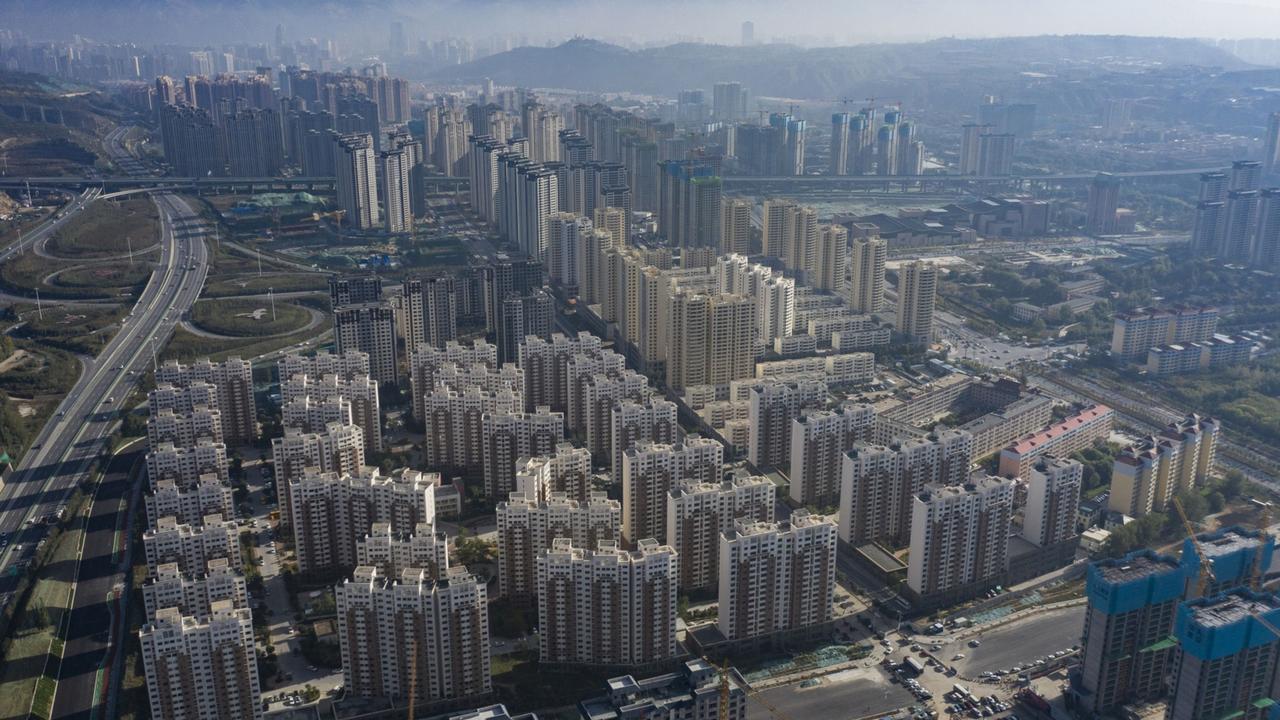RBA reveals concerns for Australia as China’s Evergrande fiasco escalates
Aussie experts are growing increasingly concerned about the Chinese property giant after it missed yet another payment, as more key deadlines loom.
Economy
Don't miss out on the headlines from Economy. Followed categories will be added to My News.
There are growing concerns for Australia as China’s Evergrande nightmare continues to leave experts – including the Reserve Bank – well and truly spooked.
The world’s most indebted real estate firm – which has racked up staggering debts totalling $A420 billion – last week missed another critical annual interest payment deadline to bondholders.
Those two missed payments, which were due on November 6, sparked yet another 30-day grace period.
They are just the latest example of missed deadlines, with other key payments also missed in September and October.
But they are just the tip of the iceberg, with Bloomberg reporting Evergrande is now facing its “biggest payment test” since the crisis began.

Evergrande’s biggest test
According to Bloomberg, another 30-day grace period for coupon payments for three dollar bonds – worth $US148.1 million ($A200 million) – ends on Wednesday, with the firm missing initial interest deadlines on those in October.
This critical deadline comes as stress spreads within China’s financial system, with investors rattled by the struggling property sector and the wider Chinese economy.
Bloomberg states that if Evergrande were to miss this latest deadline, it could “also trigger cross-default clauses among the builder’s $19.2 billion of outstanding dollar notes and give creditors more room to negotiate”.
On top of the missed payments on November 6, now subject to a 30-day grace period, Evergrande also has two more dollar coupons due in December.
“The firm’s dollar bonds remain at distressed levels as investors price in a high likelihood of an eventual restructuring,” Bloomberg states, adding that the debt crisis which started with heavily indebted real estate companies has now started to spread to the banking and tech sectors.
Evergrande’s woes began at least partly as a result of President Xi Jinping’s controversial “red lines” policy, which was introduced last year in an attempt to rein in the real estate industry’s swelling debt levels.
Under the policy, liabilities can’t outstrip assets, loans can’t be greater than the value of ordinary shares and companies must have more liquid cash than short-term debt.
The rules left Evergrande in the lurch, with the real estate juggernaut now teetering on the brink of collapse – and a string of other property companies also struggling.
RBA spooked
There are now growing fears that China’s economic woes will seriously impact Australia, with the price of iron ore already falling to less than $US90 ($A121) a tonne – the lowest point since May 2020, when the Covid-19 pandemic began taking hold.
It’s a dramatic fall from the $US200 ($A270) it fetched as recently as July this year, and reveals just how much stress is facing China’s property industry.
With iron ore Australia’s biggest export, and China our top customer, economists and major mining forms are now bracing for pain ahead.
The situation is now so dire that the Reserve Bank of Australia (RBA) discussed China’s economic issues generally and the Evergrande crisis at length in its November Statement on Monetary Policy.
The RBA noted that there was a risk that “construction activity could decline sharply” in China, “particularly if households become reluctant to purchase from property developers in the current environment”.

It wrote that residential construction activity accounts for just over 10 per cent of China’s economy, and “a slowing in this sector would dampen demand for upstream manufacturing and, in turn, commodities”.
And it could be bad news for Australia, with the RBA adding that “a broadbased growth slowdown in China would weigh on demand throughout the region and reduce commodity demand, including from Australia”.
The RBA said Evergrande’s debts now totalled 2 per cent of China’s GDP, and revealed fears the firm would not be able to repay creditors moving forward.
“In recent months, given its low levels of liquidity and inability to raise new debt, Evergrande has found it difficult to meet a range of its obligations as they have fallen due,” the RBA wrote.
“These obligations have included coupon payments, particularly on its offshore bonds. “Evergrande has delayed payments to its suppliers, which are the largest component of its reported liabilities.
We are closely watching the unfolding correction in Chinese steel prices - if it continues it could be the start of a second leg down for iron ore prices. The ongoing rise in Chinese iron ore production is a marginal play at this stage.https://t.co/oAvtd3iZKj
— Justin Smirk (@macrojustin) November 9, 2021
“Evergrande has also attempted to sell some of its assets – some at a steep discount – to raise additional cash and improve its liquidity position, but has so far been unable to complete these deals.”
The RBA added that “US dollar bond prices suggest that creditors expect to be able to recover only 25 cents on the dollar”.
And the RBA isn’t the only Australian organisation to be rattled by the worsening situation, with Justin Smirk from banking giant Westpac also weighing in.
“We are closely watching the unfolding correction in Chinese steel prices – if it continues it could be the start of a second leg down for iron ore prices. The ongoing rise in Chinese iron ore production is a marginal play at this stage,” he posted on Twitter this week.
Originally published as RBA reveals concerns for Australia as China’s Evergrande fiasco escalates








